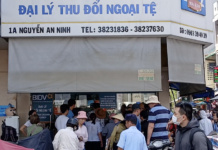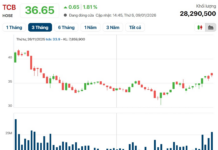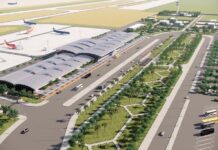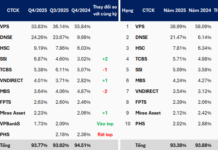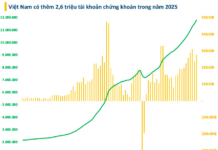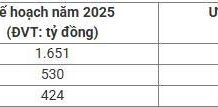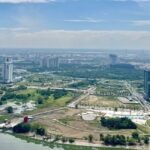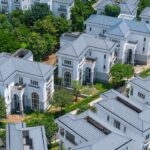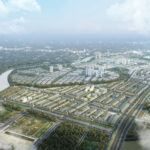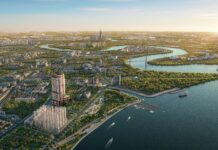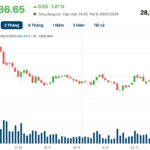The Out-of-Reach Dream of Home Ownership
Ms. Trần Ngọc Hạnh, owner of a small studio in Ho Chi Minh City, shared that despite living and working in the city for almost a decade, she has not been able to purchase a home. Currently, she rents accommodation on Đặng Thùy Trâm Street, Bình Lợi Trung Ward. Even with a monthly income of approximately 30 million VND, owning a home in Ho Chi Minh City still feels out of reach for her.
“I’ve looked into various projects in Ho Chi Minh City, and the cheapest two-bedroom apartments are around 2.7 billion VND. With my savings of 300 million VND and current income, buying a home is simply not feasible,” Ms. Hạnh said.

Ms. Hạnh, owner of a small studio in Bình Lợi Trung Ward, Ho Chi Minh City, has not been able to purchase a home despite her monthly income of approximately 30 million VND. (Photo: Đại Việt)
|
Ms. Hạnh’s situation is not unique. Mr. Nguyễn Văn Lâm, a resident of Vườn Lài Street, Phú Thọ Hòa Ward, works as a truck driver, while his wife sells vegetables at the market. The couple is approaching their 50s and still rent their home, unable to afford their own place.
With a monthly income of about 30 million VND, they can just about cover their living expenses, support their child’s university education, and pay rent. Saving up for a home of their own seems like an impossible task.
“My wife and I have managed to save a few hundred million VND, but that’s not nearly enough to buy a house in the Tân Phú area. Even the cheapest homes cost 2.5-3 billion VND, and that’s without considering the bank loan interest,” Mr. Lâm said.
In reality, an income of around 30 million VND per month may seem substantial, but in Ho Chi Minh City, it barely covers living expenses, let alone saves for the dream of homeownership. After rent, utilities, and supporting their child’s education, they are left with only a few million VND each month. To save up for the minimum 30% down payment on a 2.5-3 billion VND apartment, it would take them over a decade, and that’s without accounting for rising property prices.
Taking out a bank loan to purchase a home would only increase the financial burden. A loan of 1.5-2 billion VND, with a term of 15-20 years, would mean monthly repayments of around 15-20 million VND, including principal and interest. For households like Mr. Lâm’s, who are already stretched thin with living expenses and education costs, this is a daunting prospect. As a result, many individuals with relatively high incomes compared to the average are forced to resign themselves to long-term renting.
According to the Vietnam Real Estate Brokerage Association (VARS), the continuous rise in housing prices over the past seven months has gone against the hopes of the people, especially those with middle and low incomes.
The average apartment price in Ho Chi Minh City is nearly 80 million VND per square meter. In comparison, the average price in Hanoi is almost 76 million VND per square meter, and in Da Nang, it is over 66 million VND.
Mr. Nguyễn Văn Đính, Chairman of VARS, shared that the soaring house prices have made it increasingly difficult for many to achieve their dream of homeownership. Even those with middle to high incomes are finding it challenging to keep up with the rapidly rising prices.
“Many young people with incomes of 40-50 million VND per month wouldn’t dare to buy a house without family support. The bank only subsidizes the interest rate for the first year, and the floating interest rates in the following years can be a huge burden,” said Mr. Đính.
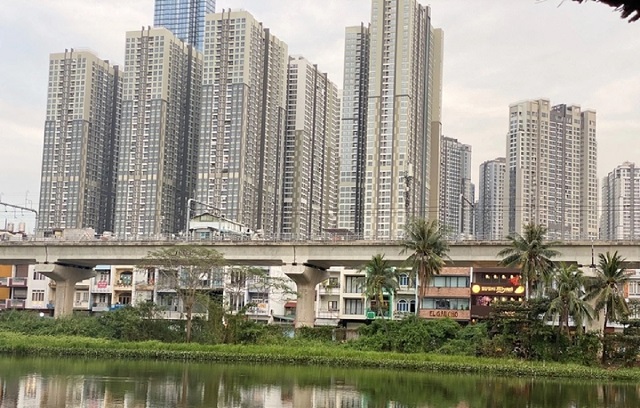
Ho Chi Minh City has seen record-high housing prices in recent years. (Photo: Đại Việt)
|
Housing Prices Outpacing Incomes, Higher Than Many Countries
Over the past decade, GRDP per capita in Ho Chi Minh City has seen little significant increase, while housing prices have skyrocketed. According to statistics from the General Statistics Office and research institutions, GRDP per capita in Ho Chi Minh City reached about $5,500 per person per year, while the average housing price was only about $1,100 per square meter.
By 2024, GRDP per capita in the city is expected to increase to around $7,600 per person per year, but the average housing price has already surged to $3,500 per square meter.
This means that in ten years, while income has increased by only 1.4 times, housing prices have jumped by 3.1 times. This disparity has made the dream of homeownership for middle-income earners even more distant and reflects an imbalanced development in the real estate market compared to the actual purchasing power of the people.
According to Savills Vietnam, in major cities like Ho Chi Minh City and Hanoi, the segment of houses priced below 2 billion VND has almost disappeared, while more than 60% of new supply is priced above 4 billion VND.
Mr. Võ Huỳnh Tuấn Kiệt, Director of the Project Marketing Department at CBRE Vietnam, pointed out that the market is mainly focused on developing luxury and ultra-luxury segments, while the actual demand lies in the range of below 60 million VND per square meter.
According to Numbeo (the world’s largest cost of living database), in 2024, the House Price to Income Ratio (HPIR) in Vietnam reached 23.7 times, significantly higher than the world average of 14.6 times. This indicates that housing prices in Vietnam are about 1.6 times higher than the global average relative to income.
Numbeo also revealed that in Vietnam, it takes a household 25 years of income to own a home, compared to the global average of 15 years. In large cities like Ho Chi Minh City, with the average apartment price hovering around 80 million VND per square meter, it would take 34 years of income to purchase a property. This puts Ho Chi Minh City as the fifth city with the highest HPIR in the world.
Another study by Batdongsan, a real estate website, suggested that based on the average income in 2024, Vietnamese citizens over 30 years old would need about 26 years of savings to buy a mid-range apartment priced at around 3 billion VND. This calculation assumes that house prices remain constant and the interest rate for deposits is maintained at 4.5%.
CBRE Vietnam assessed that with the average apartment price in Ho Chi Minh City at $3,000 per square meter and the per capita income at only $7,600 per year, the chance of owning a home in the city is even lower than in Singapore.
The Ho Chi Minh City Institute for Development Studies estimated that the financial capacity of the city’s residents could only meet about 53% of the value of the intended purchase.
This gap has made it increasingly challenging for even middle-income earners to achieve the dream of homeownership, while affordable and social housing options are scarce in the market. In reality, there are only a handful of social housing projects in Ho Chi Minh City. This situation underscores the urgent need for policies and market solutions to address the issue of affordable housing.
Đại Việt
– 10:00 17/08/2025
“Ho Chi Minh City Reassesses Land Prices for Three Build-Transfer Projects in Thu Thiem New Urban Area”
The three build-transfer (BT) projects in the Thu Thiem New Urban Area are undergoing a land value reassessment by the People’s Committee of Ho Chi Minh City. These projects, which were under the inspection of the Government Inspectorate, involve a reevaluation of the land already compensated to the investors.
“Life Imprisonment Sought for Former Chairman of Company Linked to the Hiệp Bình Chánh Residential Area”
Over 200 billion VND was embezzled through mortgage and transfer contracts of overlapping land plots in the Hiep Binh Chanh Residential Area. This sophisticated scam has left a trail of destruction, with victims suffering financial loss and a sense of betrayal. The intricate web of fraudulent activity has shaken the very foundation of trust in the real estate industry, demanding immediate attention and justice.
“The GLAMOUR by SetiaBecamex: Elevating Standards of Living in Eco-Urban Style”
The GLAMOUR, the newest premium subdivision in EcoLakes My Phuoc, has just broken ground. With its elegant Neoclassical design, modern amenities, and strategic location, this project is poised to become an iconic residential and investment landmark at the gateway to Ho Chi Minh City’s northern boundary.









